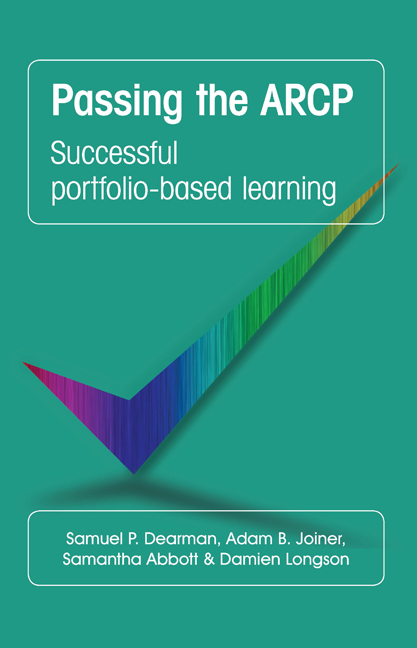Book contents
- Frontmatter
- Contents
- Authors
- List of figures
- Foreword
- Preface
- Acknowledgements
- List of abbreviations
- How to use this guide
- 1 Quick reference guide
- 2 What is a portfolio?
- 3 Lessons learned so far
- 4 Organising the portfolio
- 5 Managing your workplace-based assessments
- 6 Reflective practice and self-appraisal of learning
- 7 Audit and research
- 8 Teaching
- 9 Psychotherapy experience
- 10 Management and leadership experience
- 11 Appraisal reports, planning meetings and educational objectives
- 12 Other experiences, achievements and documents
- 13 The future of portfolios
- Index
- Frontmatter
- Contents
- Authors
- List of figures
- Foreword
- Preface
- Acknowledgements
- List of abbreviations
- How to use this guide
- 1 Quick reference guide
- 2 What is a portfolio?
- 3 Lessons learned so far
- 4 Organising the portfolio
- 5 Managing your workplace-based assessments
- 6 Reflective practice and self-appraisal of learning
- 7 Audit and research
- 8 Teaching
- 9 Psychotherapy experience
- 10 Management and leadership experience
- 11 Appraisal reports, planning meetings and educational objectives
- 12 Other experiences, achievements and documents
- 13 The future of portfolios
- Index
Summary
Teaching forms a large part of the competencies trainees need to demonstrate – especially as trainees become more senior – and is yet another role that the psychiatrist can reasonably be expected to fulfil.
Teaching can occur in a variety of situations, indirectly (e.g. shadowing by a medical student) or directly (e.g. giving a formal teaching session on the mental state examination to foundation doctors). There are therefore many opportunities in which a trainee can act as a teacher, record experience, be assessed and thus demonstrate competency. There are also courses which a trainee can attend, such as to become a communication skills tutor or to become an examiner. Examining and assessing is another important skill to develop. When planning teaching, trainees should always refer to the curriculum to ensure that this will enable development and evidence of the relevant competencies. It is valuable to plan how evidence of competency will be recorded, for example by recording topics or the use of WPBAs such as Journal Club Presentation, Case Presentation or Assessment of Teaching.
As with other areas of the portfolio, this section should record exactly what teaching has been undertaken and what skills are involved. This should follow the format:
• a clear explanation of the task and topic
• the skills required and the application of any previous training
• a reference to content
• assessments, feedback and reflection.
Reflecting on what went well and what could be done better is always valuable, especially if it adds to your professional development. Trainees may therefore wish to link the assessment or experience to a reflective note. Box 8.1 is an example of how a trainee might present their work.
- Type
- Chapter
- Information
- Passing the ARCPSuccessful Portfolio-Based Learning, pp. 45 - 47Publisher: Royal College of PsychiatristsFirst published in: 2017

